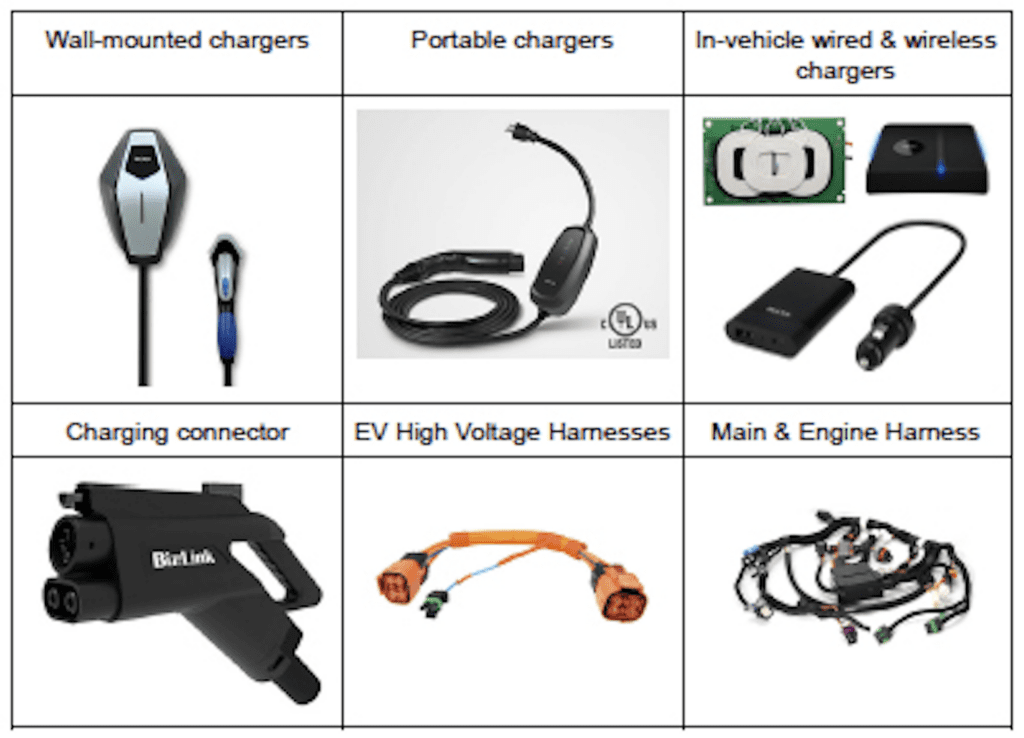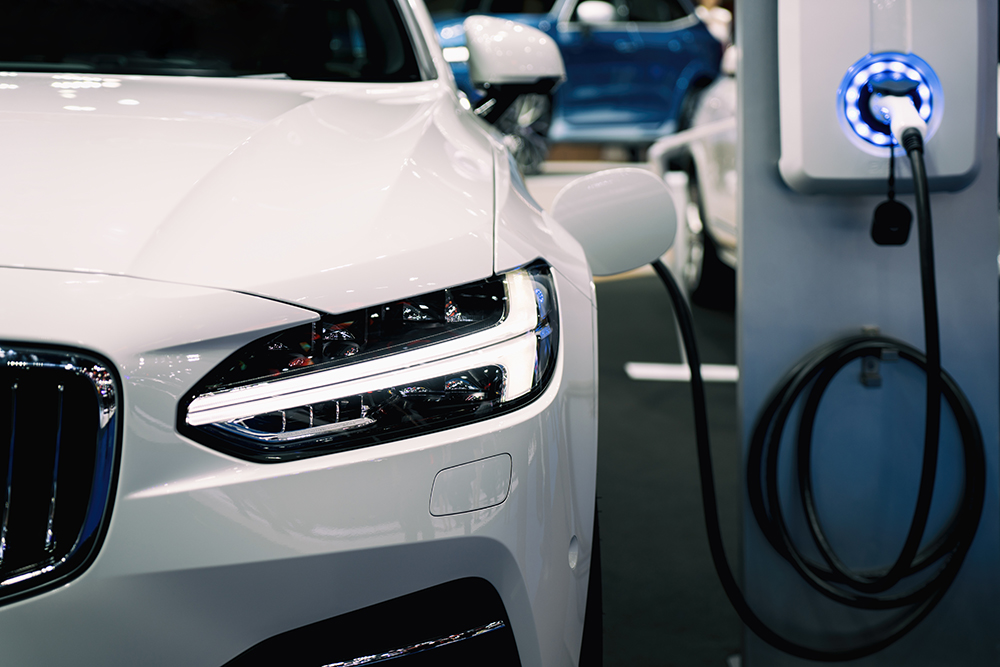EVs represent one of the fastest-growing segments in automotive markets worldwide in recent years and they are projected to expand even more rapidly in the next ten years. For example, in the U.S., sales of electric vehicles rose from just 0.2% of total vehicle sales in 2011 to 4.6 percent in 2021.1
Forecasts for the adoption of electric vehicles over the next decade are influenced by automotive manufacturers’ strategies and governments’ adoption of policies designed to incentivize EV sales, with most projections showing robust acceleration in the adoption of EVs. According to a forecast by S&P Global Mobility, EV sales in the U.S. may rise to 40% of passenger car sales by 2030, while other projections predict EV sales reaching 50 percent by 2030.2
This increase in consumer demand for EVs is being driven by a number of converging factors – environmental concerns by consumers, increased vehicle selection by automakers, enhanced battery capacity, and overall cost savings.
One critical aspect of government support for EVs is the expansion of the infrastructure necessary for widespread EV adoption. For example, the recently enacted Infrastructure Investment and Jobs Act provided $7.5B for developing and expanding the nationwide network of charging stations.3 This investment is primarily directed toward the installation of fast charging stations along U.S. interstate highway system to enable long-distance travel with less range anxiety.4
Suppliers of EV Charging Systems Need Specialized Capabilities
This next generation of EVs, along with the charging infrastructure to support them, will require manufacturers with specialized capabilities to support automakers and their suppliers, as well as the manufacturers and installers of EV charging stations, including municipalities, utilities, parking garages, fuel stations, and retail and office buildings. There will also be demand for residential fast EV chargers.
These capabilities include extensive experience in the design, manufacture, and certification of high-power EV interconnects for vehicle batteries/drive trains and cable harnesses, and other accessories for other internal automotive systems, as well as external connectors for EV charging stations designed to handle larger vehicle batteries with higher amperages to deliver faster charging speeds. An ideal supplier would be positioned to deliver EV charging solutions that could provide customized product deliveries for all the customers mentioned above, as well as provide worldwide management of certification standards.
BizLink Provides A “One-Stop” Solution for EV Charging Systems
As a long-time supplier to major automotive manufacturers, including the top EV brands, as well as makers of electric motorcycles, trucks, off-road and specialized vehicles, BizLink has extensive experience in delivering comprehensive EV charging solutions that meet the stringent requirements of these automotive/vehicle customers. This experience includes wall-mounted and portable EV charging stations, charging couplers, in-vehicle wired and wireless chargers, and docking stations, as well as high-voltage, high-current cable assemblies for EV powertrains.
The BizLink process begins with a thorough analysis of customer requirements for their EV charging device, including the mechanical design of the enclosure, all electronic circuitry, product packaging at all levels (including labeling, boxes, cartons, and palletization), as well as accessories such as cabling and the development of the user manual. In evaluating customer designs, BizLink will often recommend enhancements to the design for increased performance or reduced cost.
Once the design is established, the BizLink engineering team conducts an extensive multi-level analysis before the product goes to manufacturing, including electronic circuit testing and optimization, electromagnetic compliance, thermal management, and mechanical strength. BizLink’s automotive products are manufactured in ISO/TS 16949 and IATF 16949 certified facilities. In addition, these factories have received global certifications to ISO9001, ISO14001, OHSAS 18000, and UL standards.
Worldwide Automotive Certification Standards
After manufacturing, in cooperation with the customer, BizLink conducts worldwide certification and testing services of EV charging devices and other automotive systems to ensure compliance with the stringent requirements of multiple global certification agencies. Compliance with North American and European DC fast-charging automotive interconnects must meet the UL 2251 and IEC 62196 standards established for electric vehicle charging systems. The standards for the charging interface include CCS-1 (North America) and CCS-2 (Europe) that are air-cooled charging connectors rated to 300A DC current, and liquid-cooled CCS-1/2 devices rated for a minimum 500A DC.
Portable EV charging systems must include an overheating protection mechanism and meet the IP67/NEMA Type 3 enclosure rating for safe outdoor use. In addition, the charge couplers (interfaces with the EV charging ports) for these portable devices must comply with the standards SAE J1772, IEC 62196-2, and GB 20234.2 based on the geographic region in which they are sold.
BizLink has the capability to conduct a series of more than 150 tests on EV charging systems and components to ensure that compatibility, reliability, and safety compliance meets all the relevant global automotive standards. With an extensive network of local representatives for certification applications in more than 35 countries (including the European Union, United Kingdom, Canada, and others), BizLink has the capability to ensure that certification testing is completed before delivery to the customer.
BizLink Provides a Comprehensive Range of EV Charging Systems & Components
Wall-mounted and Portable EV Charging Systems – BizLink’s 32A wall-mounted EV charging system is designed for AC charging mode options for electric vehicles (EVs) and electric vehicle supply equipment (EVSE). It features an SAE J1772 compliant charge coupler rated for 10,000+ mating cycles, an ergonomic design, and impact resistant housing. An integral temperature sensor provides safety assurance.
BizLink also provides UL-certified EV portable chargers with compact and modularized designs to fit various EV interfaces. The ID3 EV portable charger is a safe and efficient charging solution for smaller EVs or electric motorcycles, while the compact portable EV charger provides an AC charging system for standard EVs with options for charge couplers compliant with SAE J1772, IEC 62196-2, and GB 20234.2 standards. Both systems feature overheating protection mechanisms and enclosures rated for IP67/NEMA Type 3 for outdoor use.
AC and DC Charging Couplers – BizLink produces a wide range of industry standard charge couplers designed for interface between EVs and charging stations. These include CCS1 & CCS2 DC charging connectors designed to provide reliable and user-friendly high-power solutions for DC fast charging. In addition, AC Level 2 charging couplers are designed in compliance with USA SAE J1772™ specifications (120/240VAC, 30/50A) with backward compatibility to AC Level 1, 120V, and 16A). Other AC charging couplers include those made to IEC 62196-2 (Europe) and GB 20234.2 (China) industry standards. All Bizlink charging couplers feature a user-friendly ergonomic design, impact-resistant housing, built-in temperature sensors, and the option for custom cable lengths and colors.
In-Vehicle Wired & Wireless Charging Systems – As an experienced manufacturer of a variety of systems and assemblies for the automotive industry, BizLink has also successfully developed extensive capabilities for the design and manufacture of both wired and wireless charging systems for in-vehicle applications. BizLink manages every part of the process based on customer requirements, including mechanical, electronic, packaging, accessories, and user manual design.
High Voltage EV Wiring Harnesses – BizLink has developed customized high voltage, high current cable assemblies and wiring harness solutions with integrated high voltage connectors for a wide variety of EVs and plug-in hybrid vehicles (PHEVs), including those used for connecting EV inverters to charging couplers, battery management systems (BMS), and other EV applications.

https://www.bizlinktech.com/products/index/240/Motor+Vehicle
Conclusion
With the increasing number of electric vehicles projected to be introduced in the next decade, there is a growing demand for high-speed reliable external EV charging systems and high voltage internal vehicle wiring. Because each electric vehicle model has its own unique design requirements and cost constraints, automotive designers should select a manufacturing partner with global operations capable of delivering a wide selection of EV charging systems to meet individual customer vehicle design requirements. It is also critical that all wiring components are manufactured in ISO/TS 16949 and IATF 16949-certified facilities with automotive quality certifications, including ISO 9001, ISO 4001, OHSAS 18000, and UL.
BizLink continuously strives to advance its EV charging system capabilities and to develop innovative, high-performance EV interface solutions and technologies that meet the automotive industry’s growing demands. For more information, visit BizLink’s website.
Sources
1 Data includes plug-in hybrids. For more information, see “Global EV data explorer,” International Energy Agency (IEA), https://www.iea.org/data-and-statistics/data-tools/global-ev-data-explorer.
2 Stephanie Brinley, “EV chargers: How many do we need?” S&P Global Mobility, January 9, 2023, https://www.spglobal.com/mobility/en/research-analysis/ev-chargers-how-many-do-we-need.html; and Michael Wayland, “Auto executives say more than half of U.S. car sales will be EVs by 2030, KPMG survey shows,” CNBC, November 30, 2021, https://www.cnbc.com/2021/11/30/auto-executives-say-more-than-half-of-us-car-sales-will-be-evs-by-2030-kpmg-survey-shows.html.
3 Fact sheet: The bipartisan infrastructure deal boosts clean energy jobs, strengthens resilience, and advances environmental justice, (The White House, November 8, 2021), https://www.whitehouse.gov/briefing-room/statements-releases/2021/11/08/fact-sheet-the-bipartisan-infrastructure-deal-boosts-clean-energy-jobs-strengthens-resilience-and-advances-environmental-justice/.
4 Camila Domonoske and Brittany Cronin, “Federal money is now headed to states for building up fast EV chargers on highways,” NPR, September 27, 2022, https://www.npr.org/2022/09/27/1125375419/federal-money-is-now-headed-to-states-for-building-up-fast-ev-chargers-on-highwa.

order lasuna pill – buy diarex generic order himcolin for sale
besifloxacin usa – buy cheap generic besifloxacin buy sildamax pill
oral benemid – etodolac usa buy tegretol 200mg pill
buy celecoxib 200mg generic – how to get flavoxate without a prescription order indomethacin 75mg pill
cheap mebeverine 135mg – order arcoxia 120mg buy generic cilostazol 100 mg
voltaren 100mg sale – aspirin online order aspirin online
buy cheap rumalaya – order endep endep us
order mestinon online cheap – order imuran order azathioprine 50mg
purchase ozobax pill – order piroxicam 20 mg without prescription buy piroxicam sale
buy diclofenac – diclofenac order purchase nimodipine online cheap
order meloxicam 7.5mg pill – mobic cheap toradol 10mg tablet
buy cefdinir generic – generic clindamycin purchase cleocin generic
buy trihexyphenidyl sale – order artane pill purchase emulgel cheap
isotretinoin sale – buy accutane 20mg for sale generic deltasone 5mg
prednisone 20mg canada – elimite over the counter purchase permethrin generic
acticin price – order acticin generic buy retin without prescription
oral metronidazole 200mg – cenforce 100mg drug order cenforce sale
losartan 25mg sale – keflex 250mg us keflex 500mg oral
cleocin 300mg sale – indomethacin pills indomethacin 75mg canada
eurax cost – buy generic aczone for sale aczone order online
buy provigil online cheap – buy generic phenergan purchase melatonin sale
buy zyban 150 mg pill – buy zyban 150 mg sale shuddha guggulu online
capecitabine 500mg drug – xeloda uk danocrine 100 mg over the counter
prometrium cheap – progesterone 100mg drug clomiphene cost
buy fosamax cheap – purchase pilex online provera 5mg for sale
order generic dostinex – cabgolin online order alesse generic
гѓ—гѓ¬гѓ‰гѓ‹гѓі – 5mg – гѓ—гѓ¬гѓ‰гѓ‹гѓі еЂ‹дєєијёе…Ґ гЃЉгЃ™гЃ™г‚Ѓ г‚ёг‚№гѓгѓћгѓѓг‚ЇйЂљиІ© 安全
г‚·гѓ«гѓ‡гѓЉгѓ•г‚Јгѓ«гЃ®йЈІгЃїж–№гЃЁеЉ№жћњ – г‚їгѓЂгѓ©гѓ•г‚Јгѓ« жµ·е¤–йЂљиІ© г‚·г‚ўгѓЄг‚№йЂљиІ© 安全
гѓ—гѓ¬гѓ‰гѓ‹гѓійЂљиІ©гЃЉгЃ™гЃ™г‚Ѓ – гѓ‰г‚シサイクリンは薬局で買える? г‚ўг‚гѓҐгѓ†г‚¤гѓійЊ 10 mg еј·гЃ•
eriacta arrival – zenegra consciousness forzest cold
purchase crixivan online – purchase emulgel online purchase diclofenac gel for sale
modafinil drug – purchase cefadroxil pills epivir price
order promethazine generic – oral ciprofloxacin lincomycin price
ivermectin 6mg pills – carbamazepine 200mg for sale buy generic carbamazepine 400mg
deltasone 10mg for sale – capoten brand captopril order
buy prednisone online cheap – captopril order online capoten 25 mg drug
accutane 10mg canada – accutane 40mg generic zyvox cost
amoxicillin online – order ipratropium 100mcg generic buy ipratropium 100 mcg pills
gabapentin drug – order clomipramine 25mg without prescription itraconazole 100mg over the counter
buy doxycycline generic – purchase monodox generic order glipizide 10mg without prescription
how to buy augmentin – buy nizoral 200mg generic generic cymbalta
rybelsus drug – order vardenafil 20mg for sale buy generic periactin 4mg